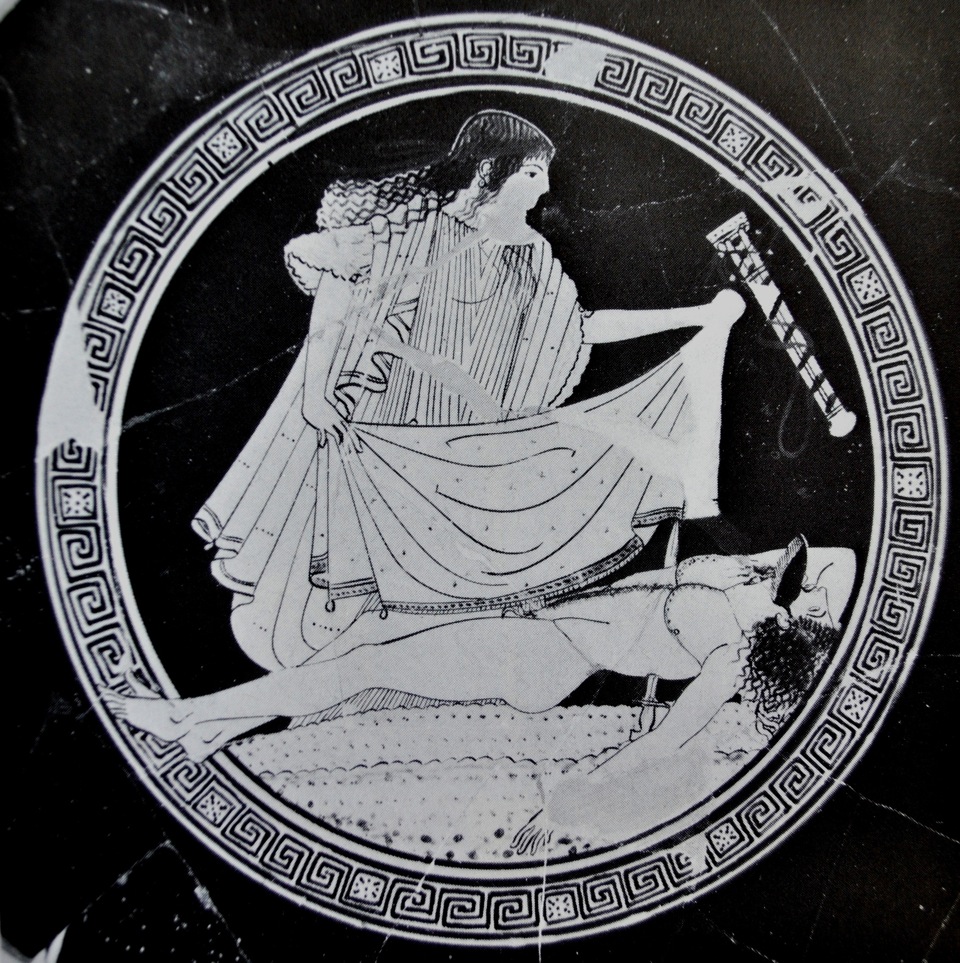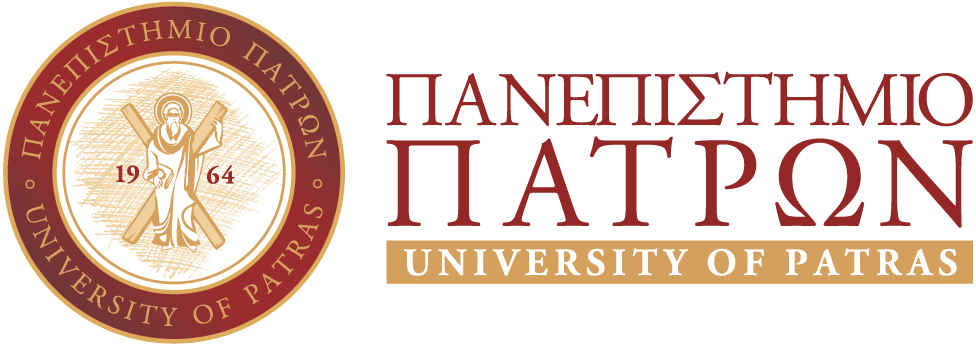Μάθημα : Αρχαίο Ελληνικό Δράμα: Αισχύλος - Σοφοκλής
Κωδικός : LIT1868
LIT1868 - Ευφημία Καρακάντζα
Περιγραφή Μαθήματος

Με το παρόν μάθημα πραγματοποιείται η εισαγωγή των φοιτητών στο δράμα (καταγωγή του δράματος). Παρουσιάζονται τα διαθέσιμα στοιχεία για τον βίο του Αισχύλου, καθώς και για το έγο του (χρονολόγηση και υποθέσεις των σωζόμενων δραμάτων). Αναφορικά με τον Σοφοκλή, εκτός της βιογραφίας και εργογραφίας του, μελετώνται και οι νέες ιδεολογικές συνθήκες σύνθεσης τραγωδίας. Ως βασικό κείμενο για το μάθημα χρησιμοποιείται ο Αίας του Σοφοκλή (ο μύθος του, οι αποκλίσεις από τον ιλιαδικό Αίαντα), με έμφαση στην μετάφραση, την γραμματική, το συντακτικό και την ερμηνευτική - ιδεολογική προσέγγιση. Τέλος, μελετάται από μετάφραση η Αντιγόνη του Σοφοκλή, με στόχο την κατάδειξη των διαδεδομένων πλανών στην ερμηνεία της, ενώ παρουσιάζονται σύγχρονες ερμηνευτικές προσεγγίσεις.
-
Περιεχόμενο μαθήματος
Με το παρόν μάθημα πραγματοποιείται η εισαγωγή των φοιτητών στο δράμα (καταγωγή του δράματος). Παρουσιάζονται τα διαθέσιμα στοιχεία για τον βίο του Αισχύλου, καθώς και για το έγο του (χρονολόγηση και υποθέσεις των σωζόμενων δραμάτων). Αναφορικά με τον Σοφοκλή, εκτός της βιογραφίας και εργογραφίας του, μελετώνται και οι νέες ιδεολογικές συνθήκες σύνθεσης τραγωδίας. Ως βασικό κείμενο για το μάθημα χρησιμοποιείται ο Α?ας του Σοφοκλή (ο μύθος του, οι αποκκλίσεις από τον ιλιαδικό Αίαντα), με έμφαση στην μετάφραση, την γραμματική, το συντακτικό και την ερμηνευτική -ιδεολογική προσέγγιση. Τέλος, μελετάται από μετάφραση η ?ντιγόνη του Σοφοκλή, με στόχο την κατάδειξη των διαδεδομένων πλανών στην ερμηνεία της, ενώ παρουσιάζονται σύγχρονες ερμηνευτικές προσεγγίσεις.
Προτεινόμενα συγγράμματα
Λορεντζάτος, Π. Σοφοκλέους Αίας. Αθήνα, (Εστία 1932) Παπαδήμας 2002.
Βιβλιογραφία
Barker, E. T. E. (2004) ''The Fall-Out of Dissent: Hero and Audience in Sophocles' Ajax'', G&R 2nd ser. 51 :1-20
Beer, J. (2004) Sophocles and the Tragedy of Athenian Democracy. Contribution in Drama and Theatre Studies 105. Westport, CT.
Belfiore, E. (1998)'' Harming friends: problematic reciprocity in Greek tragedy'', in Gill et al, Reciprocity in Ancient Greece (Oxford 1998):139-158.
Biggs, P. (1966), ''The disease theme in Sophocles' Ajax, Philoctetes and Trachiniae'', CP 61: 223-235.
Blume, H. - D. (2004), ''The staging of Sophocles' Aias'', Mediterranean Archaeology 17: 113-120.
Bradshaw, D. J. (1991) ''The Ajax myth and the Polis: old values and new'', in Pozzi and Wickersham (1991), Myth and Polis (Ithaca & London): 99 - 125.
Brown, W. E. (1965) ''Sophocles' Ajax and Homer's Hector'', CJ 61: 118-121.
Burian, P. (1972) ''Supplication and hero cult in Sophocles' Ajax'', GRBS 13: 151-156.
Buxton, R. G. A. (2006) ''Weapons and white horses: the language of Ajax'', in De Jong and Rijksbaron (2006), Sophocles and the Greek language. Aspects of Diction, Syntax, and Pragmatics (Mnem. Suppl. 269; Leiden and Boston): 13-23.
Cairns, D. L. (2006) ''Virtue and Vicissitude: the paradoxes of the Ajax'' in Cairns and Liapis (2006), Dionysalexandros. Essays on Aeschylus and his Fellow Tragedians in Honour of Alexander F. Garvie (Swansea): 99-131.
Calder, W. M. III (1965) ''The entrance of Athena in Ajax'', CP 60: 114-116.
Calder, W. M. III (1974) ''Once more: the entrance and exit of Athene in Ajax'' Classical Folia 28: 59-61.
Cohen, D. (1978) "The Imagery of Sophocles: A study of Ajax' suicide", Greece & Rome 2nd ser. 25.1: 24-36.
Davidson, J. F. (1975) '' The parodos of Sophocles Ajax'', BICS 22: 163-177.
Davidson, J. F. (1976) ''Sophocles, Ajax 192 - 200'', Mnemosyne 4th ser. 29: 129-135.
Davidson, J. F. (1976) ''Sophocles, Ajax 172 - 179'', AJP 104: 192-198.
Davidson, J. F. (1976) ''Sophocles, Ajax 148 - 150'', Mnemosyne 4th ser. 37: 438-440.
Diggle, J. (1976) ''Sophocles Ajax 589'', Prometheus 2: 83.
Finglass, P. J. (2009) ''Interpolation and responsion in Sophocles' Ajax'', CQ NS 59: 335?352.
Finglass, P. J. (2011) Sophocles Ajax. Cambridge Classical Texts and Commentaries (Cambridge).
Finglass, P. J. (2011) ''Ajax in Markantonatos (ed.) (2011), Brills' Companion to Sophocles (Leiden).
Fisher, N. R. E. (1992) Hybris. A Study in the Values of Honour and Shame in Ancient Greece (Warminster).
Gardiner, C. P. (1979) ''The staging of the death of Ajax'', CJ 75: 10-14.
Gasti, H. (1992) ''Sophocles' Ajax: the military hybris'', QUCC n. s. 40: 81-93.
Golder, H. (1990) ''Sophocles' Ajax: beyond the shadow of time'', Arion 3rd ser. 1: 9?34.
Golder, H. (1992) ''Visual meaning in Greek drama: Sophocles' Ajax and the art of dying'', in Poyatos (1992), Advances in nonverbal Communication. Sociocultural, Clinical, Esthetic and Literary Perspectives (Amsterdam and Philadelphia).
Griffith, M. (1999) Antigone. Sophocles (Cambridge - New York, Cambridge University Press).
Gronewald, M. (1987) ?251. Sophocles, Aias 1-11?, K?lnerPapyri 6: 127-128.
Halleran, M. R. (1992) ''Sophocles, Ajax 430 ff.'', Mnemosyne 4th ser. 45: 358-359.
Heath, M. F. & Okell, E. R. (2007) ''Sophocles' Ajax: expect the unexpected'', CQ n. s. 57: 363?380.
Henrichs, A. (1993) ''The tomb of Aias and the prospect of hero cult in Sophocles'', CA 12: 165-180.
Herington, J. (1988) Αισχύλος. Mετάφραση Μαρία Γιούνη (Θεσσαλονίκη, Βάνιας).
Hesk, J. (2003) Sophocles. Ajax (London).
Kane, R. L. (1996) ? Ajax and the sword of Hector: Sophocles, Ajax 815- 822?, Hermes 124: 17-28.
Know, B. M. W. (1961) ''The Ajax of Sophocles'' HSCP 65: 1-37.
Knox, B. M. W. (1964) The heroic temper: studies in sophoclean tragedy (Berkeley, University of California Press).
Lardinois, A. P. M. H. (2006) ''The polysemy of gnomic expressions and Ajax' deception speech'', in De Jong & Rijksbaron (2006): 213-223.
Lawrence, S. (2005) ''Ancient ethics, the heroic code, and the morality of Sophocle' Ajax'', G&R 2nd ser. 52: 18-33.
Lloyd-Jones, P. H. J. (1985) ?Sophocles, Ajax 624 f.? Sch?ublin, C. (1985) Catalepton. Festschrift f?r Bernhard Wyss zum 80. Geburtstag (Basel): 16-18.
Λορεντζάτος, Π. ([1932] 2002) Αίας Σοφοκλέους (Αθήνα, Εκδόσεις Παπαδήμα).
Magnani, M. (2007) ''Soph. Ai. 1190'', Eikasmos 18: 157-165.
March, J. R. (1991-3) ''Sophocles' Ajax: the death and burial of a hero'', BICS 38: 1-36.
Mills, S. P. (1980 - 1981) "The Death of Ajax", The Classical Journal 76.2: 129-135.
Minadeo, R. W. (1987) ?Sophocles? Ajax and kakia?, Eranos 85: 19?23.
Pearce, T. (1996) ''Sophocles, Ajax 1023'', RhM n. F. 139: 351-352.
Platt, A. (1911) "The Burial of Ajax", The Classical Review 25.4: 101-104.
Rosenbloom, D. (2001) ''Ajax is megas. Is that all we can say'', Prudentia 33: 109-129.
Rosivach, V. J. (1975) ''Ajax' intended victims'', CW 69: 201-202.
Scodel, R. (2003) ''The politics of Sophocles' Ajax'', SCI 32: 31-42.
Scodel, R. (2006) ''Aetiology, autochtony, and Athenian identity in Ajax and Oedipus Coloneus'' in Davidson J. F et al. (2006), Greek Drama III. Essays in honour of Kevin Lee: 65-78.
Segal, C. P. 1995) Sophocles' Tragic World. Divinity, Nature, Society (Cambridge, MA and London).
Sourvinou - Inwood, C. (1989) "Assumptions and the Creation of Meaning: Reading Sophocles' Antigone", The Journal of Hellenic Studies 109: 134 -148.
Sourvinou - Inwood, C. (1990), "Sophocles' Antigone as a Bad Woman" in Dieteren, F. - Kloek, E. (eds.) (1990) Writing Women into History (Amsterdam, Amsterdamse Historische): 11-40.
Svenbro, J. (2000) "Une suicide theologiquement correct sur l' Ajax du Sophocle", Etudes litteraires 33.1: 113-127.
Wigodsky, M. M. (1962) ''The 'salvation' of Ajax'', Hermes 90: 149?158.
Young, D. C. (1966) ?Sophocles Ajax 516?, CP 61: 49-50.
Ziobro, W. J. (1972) ''The entrance and exit if Athena in the Ajax'', Classical Folia 26: 122-128.
Μαθησιακοί στόχοι
Στόχος του μαθήματος είναι η εξοικείωση με το έργο των δύο μεγάλων τραγικών ποιητών, του Αισχύλου και του Σοφοκλή.
Μελέτη από το πρωτότυπο της παρόδου (στ. 134 - 200) της τραγωδίας Α?ας του Σοφοκλή - Γλωσσικός και ιδεολογικός σχολιασμός.
Μελέτη από το πρωτότυπο του α΄ κομμού (στ. 201 - 262) της τραγωδίας Α?ας του Σοφοκλή - Γλωσσικός και ιδεολογικός σχολιασμός.
Μελέτη από το πρωτότυπο του διαλόγου Τέκμησσας-Χορού (στ. 263 - 347) από την τραγωδία Α?ας του Σοφοκλή - Γλωσσικός και ιδεολογικός σχολιασμός.
Μελέτη από το πρωτότυπο του β΄ κομμού (στ. 348 - 429) της τραγωδίας Α?ας του Σοφοκλή - Γλωσσικός και ιδεολογικός σχολιασμός.
Μελέτη από το πρωτότυπο των στίχων 430-480 του α΄ επεισοδίου της τραγωδίας Α?ας του Σοφοκλή - Γλωσσικός και ιδεολογικός σχολιασμός.
Μελέτη από το πρωτότυπο των στίχων 646-692 του β΄ επεισοδίου της τραγωδίας Α?ας του Σοφοκλή - Γλωσσικός και ιδεολογικός σχολιασμός.
Μελέτη από το πρωτότυπο των στίχων 756-779 του γ΄ επεισοδίου της τραγωδίας Α?ας του Σοφοκλή - Γλωσσικός και ιδεολογικός σχολιασμός.
Μελέτη από το πρωτότυπο των στίχων 815-865 του γ΄ επεισοδίου της τραγωδίας Α?ας του Σοφοκλή - Γλωσσικός και ιδεολογικός σχολιασμός.
Ημερολόγιο
Ανακοινώσεις
Όλες...-
Πέμπτη 21 Δεκεμβρίου 2017 - 3:15 μ.μ.
-
Δευτέρα 27 Νοεμβρίου 2017 - 11:14 μ.μ.
-
Δευτέρα 20 Νοεμβρίου 2017 - 3:35 μ.μ.
Ανοικτό Ακαδ. Μάθημα

Αρ. Επισκέψεων : 0
Αρ. Προβολών : 0
